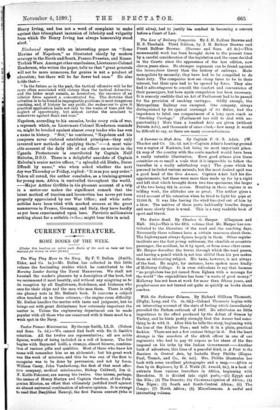The Law of Railway Companies. By J. H. Balfour Browne
and H. S. Theobald. Third Edition, by J. H. Balfour Browne and Frank Balfour Browne. (Stevens and Sons. £2 2s.)—This monumental work has been brought down to the present time by a careful consideration of the legislation and the cases decided in the Courts since the appearance of the last edition, now eleven years since. No stronger argument can be found against the laissez-faire theory than the history of railways. Made monopolists by necessity, they have had to be compelled to do their duty. The companies now see cheap fares to be to their interest, but their eyes had to be opened by force. They also find it advantageous to consult the comfort and convenience of, their passengers, but here again compulsion has been necessary. It is scarcely credible that an Act of Parliament had to be passed for the provision of smoking carriages. Oddly enough, the Metropolitan Railway was excepted. One company, always distinguished by its cynical contempt of its duties, had the impudence to label one compartment of a long open coach as "Smoking Carriage." (Parliament has still to deal with un- punctuality.) Moie than a hundred Acts are given (without Private Acts), and thousands of cases cited,—how many it would be difficult to say, as there are many cross-references.






















































 Previous page
Previous page